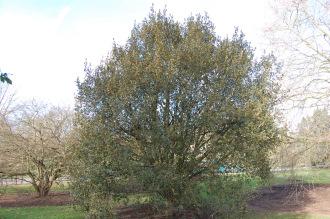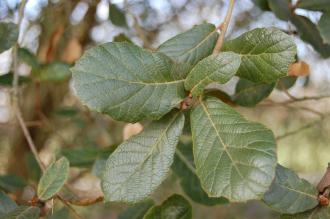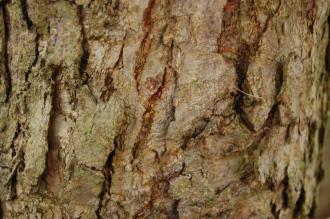
Quercus reticulata (08/02/2015, Kew Gardens, London)
Position: Full sun
Soil: Free draining soil
Flowering period: Spring
Eventual Height: 10m
Eventual Spread: 10m
Hardiness: 7b, 8a, 8b, 9a, 9b, 10a, 10b
Family: Fagaceae
Quercus reticulata is an evergreen tree with a rounded habit. Its evergreen dark green leaves are leathery, obovate with undulate margins, up to 10cm long and 7cm wide. Its bark is light brown and fissured. Its male flowers are yellow catkin. Its fruit are acorns which are up to 12mm long.

Quercus reticulata Leaf (08/02/2015, Kew Gardens, London)
Quercus reticulata, commonly known as Netleaf Oak, is native to the south west USA and Mexico.
The etymological root of the binomial name Quercus is the ancient Latin name for an oak tree but some authorities believe it to be derived from the Celtic quer meaning ‘fine’ and cuez meaning ‘a tree’. Reticulata is from the Latin meaning ‘net like’.
The Landscape architect may find Quercus reticulata useful as an evergreen specimen tree. Once established this tree is drought tollerant.

Quercus reticulata Bark (08/02/2015, Kew Gardens, London)
Ecologically, Quercus reticulata is valuable to birds to provide shelter and nesting sites. The acorns also provide a source of food for birds and mammals.
Quercus reticulata prefers moist, fertile, well-drained soils. It tolerates most pH of soil.
Quercus reticulata requires little maintenance. Pruning should be carried out in late autumn to winter.

